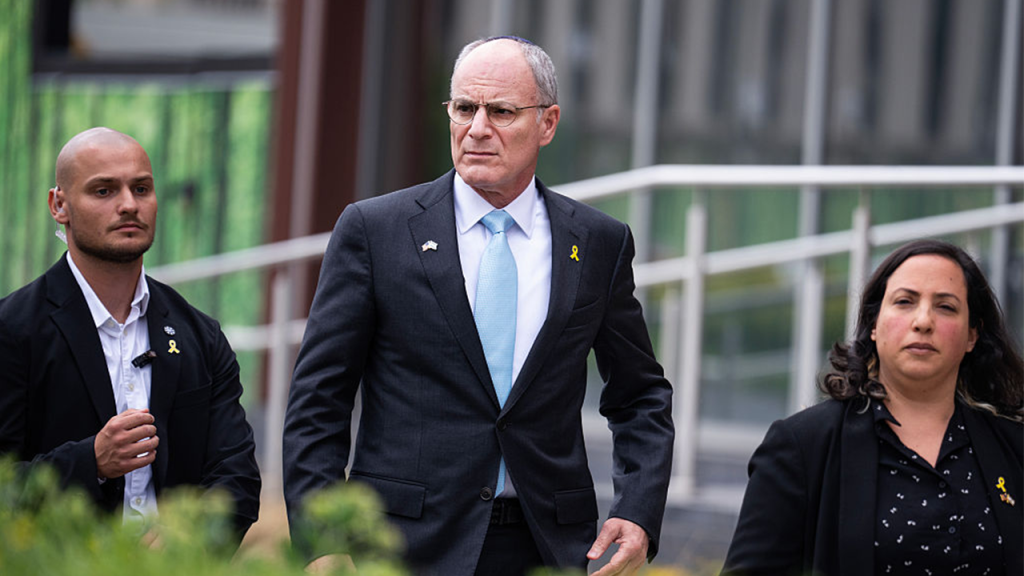Israel’s Ambassador to the U.S., Yechiel Leiter, has hinted at significant developments in the ongoing tensions between Israel and Iran, suggesting surprises that could eclipse prior actions against Hezbollah in Lebanon and Syria. Speaking on the TV network Merit Street, he alluded to upcoming operations that would have far-reaching implications. The ambassador underscored Israel’s current military initiatives while also clarifying the nation’s stance on regime change in Iran, emphasizing the focus on neutralizing threats rather than political upheaval.
| Article Subheadings |
|---|
| 1) Recent Strikes Against Hezbollah |
| 2) Israel’s Plan for Upcoming Surprises |
| 3) The U.S. Response and Reactions |
| 4) Israel’s Stance on Regime Change |
| 5) The Economic Impact of Current Events |
Recent Strikes Against Hezbollah
The tensions between Israel and Iran have escalated dramatically, particularly regarding Hezbollah—an Iran-backed paramilitary group active in Lebanon and Syria. In September of last year, Israel executed a complex military operation that involved detonating pagers and walkie-talkies, which resulted in a tragic loss of life, including at least 12 fatalities and nearly 3,000 injuries. The U.S. government was informed post-attack, confirming Israel’s involvement in the operations. The measures taken were directly linked to crippling Hezbollah’s operational capabilities, indicating Israel’s ongoing commitment to neutralizing threats from the group.
The coordinated strikes revealed a sophisticated approach toward counterterrorism, reflecting Israel’s strategic military planning. As tensions continue to simmer, the recent military actions underscore Israel’s emphasis on maintaining security and stability amidst potential threats from various factions. The context of these operations is crucial, revealing an intricate web of relations that influence the geopolitical climate in the Middle East.
Israel’s Plan for Upcoming Surprises
Ambassador Yechiel Leiter stated during his appearance that Israel has additional surprises planned that will go beyond previous operations against Hezbollah’s communication devices. He hinted that the operations planned for the upcoming Thursday and Friday would showcase an enhanced level of sophistication and impact. “When the dust settles,” he said, “you’re going to see some surprises that will make the beeper operation almost seem simple.”
The strategic timing of these operations coincides with a broader military initiative aimed at crippling Iran’s missile capabilities. Leiter specified that Israel has made significant inroads, claiming that they have demolished a substantial portion of surface-to-surface missile systems in Iran. This assertion underscores their operational goal of neutralizing threats while instilling a cautious approach toward Iran’s nuclear ambitions.
The U.S. Response and Reactions
The response from the U.S. has been mixed in light of these developments. Following the attacks last September, then-Secretary of State Antony Blinken clarified that the U.S. had no prior knowledge and was not involved in Israel’s military operations. This statement emphasizes the delicate balance the U.S. must maintain between supporting Israel and managing its complex relationships in the region.
As Israel embarks on further military actions, officials continue to monitor the situation closely. The U.S. has a vested interest in ensuring that these operations do not escalate beyond control, potentially dragging American forces or interests into the fray. The strategic communication from both Israeli officials and U.S. representatives reflects ongoing concerns about stability in the region.
Israel’s Stance on Regime Change
During recent televised appearances, Ambassador Leiter addressed the topic of regime change in Iran, firmly stating that Israel is not seeking to change the Iranian government. Instead, he stressed Israel’s commitment to neutralizing existential threats arising from Iran’s nuclear and missile programs. “We’re not in the business of regime change,” Leiter reiterated, focusing instead on the imperative of stopping Iran’s nuclear ambitions.
The ambassador stated that if the Iranian populace decides to rise against their own government, that is their choice, but Israel’s primary focus remains on its own security. He claimed that neutralizing threats is paramount, although he acknowledged the role of international perception and historical narrative regarding Israel’s actions in the region.
The Economic Impact of Current Events
In light of ongoing military engagements, Ambassador Leiter asserted that Israel’s economy remains stable and resilient. He noted that, despite the ongoing conflict, the Israeli stock market has continued to rise for consecutive days, indicating that investor confidence has not been significantly shaken by the tumultuous geopolitical landscape.
This economic resilience is crucial for maintaining public morale and stability within Israel. The government is also exploring solutions for those civilians affected by the conflict—both those wishing to leave Israel and those attempting to return home. This ongoing effort highlights the humanitarian considerations amid military operations.
| No. | Key Points |
|---|---|
| 1 | Israel’s Ambassador to the U.S. has indicated upcoming military actions against Iran. |
| 2 | Recent operations against Hezbollah resulted in significant casualties and injuries. |
| 3 | The U.S. government has stated it was not involved in prior Israeli operations. |
| 4 | Israel maintains it is not pursuing regime change in Iran. |
| 5 | Despite conflict, Israel’s economy has shown resilience and continued growth. |
Summary
The ongoing tensions between Israel and Iran present a complex geopolitical landscape marked by military engagements, economic considerations, and international dynamics. Ambassador Yechiel Leiter‘s statements reflect Israel’s strategic aims while clarifying its stance on regime change in Iran. As Israel prepares for further operations, the implications of these actions will resonate throughout the Middle East and may significantly affect regional stability moving forward.
Frequently Asked Questions
Question: What military actions has Israel taken against Hezbollah?
Israel executed operations that involved detonating devices used by Hezbollah, leading to significant casualties and injuries in the region, showcasing a commitment to neutralizing threats from the group.
Question: What is Israel’s current stance on regime change in Iran?
Israel maintains that it is not involved in regime change efforts in Iran, focusing instead on eliminating threats posed by Iran’s nuclear and missile programs.
Question: How is Israel’s economy performing amid the conflict?
Despite ongoing military actions, Israel’s economy has demonstrated resilience, with the stock market showing consistent growth, indicating investor confidence in the nation’s stability.


